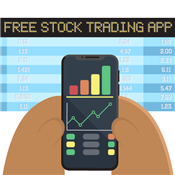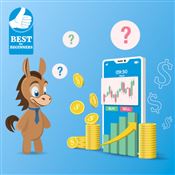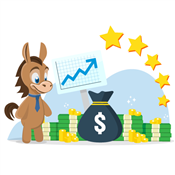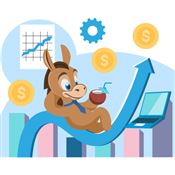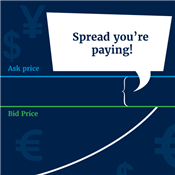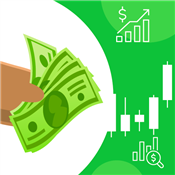Paper Trading Account
Curious about paper trading? You'll find everything you need to know about paper trading accounts in this detailed guide. Keep reading to learn more.
 |
Paper trading is an excellent way to build your confidence as an investor. You can test strategies without the risk of losing cash and get comfortable with a platform's tools.
But which paper trading account is best?
This guide will take a closer look at the best platforms for paper trading stocks, options, and futures. Plus, you'll learn how it works and the downsides of paper trading.
What is Paper Trading?
Paper trading is trading virtual money on a simulated version of the stock market. It's a helpful technique for anyone new to the stock market, as it provides an opportunity to "trade" without the risk.
Here's how you might benefit from a paper trading account:
- Understand the market better: By recording trades and tracking open positions, you can get a deeper understanding of the market than you would simply by reading books or listening to lectures.
- Get used to experiencing gains and losses: Of course, the emotions involved in trading with a paper account aren't the same as if real money was involved - but it's still good practice.
- Get familiar with a specific sector or asset class: Try paper trading stocks, options, futures, or even crypto and Forex.
Many platforms offer free paper trading accounts. We'll take a look at some of the best ones further down. But for now, let's look at some of the different types of paper trading and how to do each.
How to Paper Trade
 |
If you're new to the stock market, paper trading stocks is a good option. More advanced traders may consider paper trading options or futures. You'll learn about each below.
Many stock market simulators will give you $100,000 in virtual money. Then, it's up to you to make smart investments and build a healthy investment portfolio.
Paper trading will give you a better sense of how the market behaves from day-to-day.
You'll also learn to weather the emotions that come with the rise and fall of your investments, which can be stressful.
If this sounds worthwhile, the first step is to open your paper trading account.
Step 1: Choose A Paper Trading Account
When choosing your paper trading account, the first decision is selecting what you want to invest in. Are stocks, options, or futures right for you?
Most traders will want to select stocks. More advanced traders may consider options or futures.
As you're reviewing paper trading accounts, keep an eye out for these important features:
- Charts: You may prefer having only a few easy-to-use charts, or you may want a more advanced suite of charts to confirm your trades visually.
- Watchlists: Follow your favorite securities in one list, so you can easily track price fluctuations, volume, gain, and more.
- Datafeed: Track real-time prices to replicate actual market conditions.
- Trade Reports: Review your trade history to learn as much as you can.
You'll also want to consider the cost of your paper trading account. The main goal of paper trading is to practice trading without losing money, so check out the free tools first.
If you want more advanced features, you may want to look for more premium tools.
But most traders wouldn't want to pay for a paper trading account.
Where Can I Paper Trade Stocks?
Several popular stock paper trading platforms exist. Some of the most popular include:
- eToro: eToro Demo Account
- Tradestation: TradeStation Simulated Trading
- E*Trade: Power E*TRADE Paper Trading
- TD Ameritrade: Thinkorswim's paperMoney
- Interactive Brokers: Interactive Brokers Paper Trading Account
- Webull: Webull Paper Trading Account
No, Fidelity doesn't offer any paper trading accounts at this time.
Where Can I Paper Trade Options?
Several options paper trading platforms exist. Some of the most popular include:
- Tradestation: TradeStation Simulated Trading
- Tradezero: Tradezero Demo Account
- TD Ameritrade: Thinkorswim's paperMoney
- Interactive Brokers: Interactive Brokers Paper Trading Account
- Tradier: TradeHawk FREE Paper Trading Account
Where Can I Paper Trade Futures?
Several futures paper trading platforms exist. Some of the most popular include:
- Tradestation: TradeStation Simulated Trading
- E*Trade: Power E*TRADE Paper Trading
- TD Ameritrade: Thinkorswim's paperMoney
- Interactive Brokers: Interactive Brokers Paper Trading Account
Step 2: Open A Paper Trading Account
In the past, opening a trading account was time-consuming. You would have to make an appointment at a financial institution. Then fill out an application, and sit down for an interview with a broker.
But these days, you can open a paper trading account online in just a few minutes.
Some require you to verify your identity with your address and Social Security number. In comparison, other paper trading accounts may only need your email.
Once you're signed up, you're ready to start learning their platform.
Step 3: Learn the Paper Trading Platform
The best paper trading tools for beginners will be easy-to-use. You should generally know how to build a watchlist, check your charts, and even make a trade in a few minutes.
You can look for features such as:
- Watchlist: Add your favorite stocks, options, or futures.
- Portfolio: Track the securities you purchase.
- Discover: Find new investments to watch.
Step 4: Start Paper Trading
You can now make your first trades. Whether you've chosen to trade stocks, options, or futures, this is where the fun starts.
There are many types of trades, but new traders commonly use two:
- Market orders: You'll pay the current market price. This is the most simple and quick order.
- Limit orders: You set the maximum or minimum price you'll buy or sell a stock for. The order will go through if the stock reaches this price.
Since you're trading with virtual money, you may be tempted to take larger risks than if you were using real money. This is okay but remember you're practicing to start trading for real eventually.
Step 5: Build Your Trading Skills
Paper trading lets you form a trading strategy and test that strategy, so you'll increase your chances of success.
You may want to backtest your proposed strategies. Or you may want to try social and copy trading.
You'll also want to understand Modern Portfolio Theory as you consider the risk and return of your investments.
Paper Trade Stocks vs. Options vs. Futures
Stocks are the most common investment on the market and are a great place to start. Most traders and investors may never trade anything else.
But you can also experiment with trading options and futures, which could teach you vital trading lessons.
Which is right for you? Read on.
How To Paper Trade Stocks
Paper trading stocks let you virtually invest in your favorite companies. You can start by listing your favorite companies and adding them to your Watchlist.
You would want to research them by reading about their financials on the best stock advisor websites.
Then track your portfolio over the coming days and weeks to understand how the market moves.
But stocks aren't the only investments on the market.
How To Paper Trade Options
Trading options is a bit more complicated than trading regular stocks, so paper trading options are an ideal way to learn the ropes.
One advantage of options trading is that it carries potentially lower risk than stock trading since you can withdraw anytime. However, unlike stocks, they don't represent ownership in a company. Instead, they're part of an asset class known as derivatives because their value is derived from something else.
When you open an option contract, you pay a fee known as a premium to lock in the price until the contract expires.
You have to pay the premium regardless of whether you choose to exercise the option contract or not, and this is one cost you can avoid through learning via option paper trading.
When trading options, you can buy and sell calls and puts.
There is also potentially substantial risk involved in options trading, where you could lose large sums of money, especially for those selling calls and puts. That's another reason why practicing with a paper trading account is a good idea.
How To Paper Trade Futures
Futures are similar to options in many ways. However, while options contracts don't obligate the investor to buy or sell the underlying asset, futures contracts do.
A futures contract requires that the asset in question be bought or sold at a set price at a later date. It's often used to hedge against dramatic price changes of commodities.
Futures were initially created for institutional buyers who intended to purchase and take possession of the commodities the futures represented. But it's also possible for retail investors to use futures to speculate on the future price of the commodity to profit.
Paper Trading vs Live Trading
Paper trading is good practice for live trading, but it's important to understand the differences and similarities to avoid making mistakes.
| Features | Paper Trading | Live Trading |
|---|---|---|
| Email Address Required | Yes | Yes |
| Identity Verification Required | No | Yes |
| Initial Investment Required | No | Yes |
| Taxable Events | No | Yes |
| Refill Your Account Balance | Yes | No |
| Full Set of Features | Not usually | Yes |
Pros & Cons of Paper Trading?
Paper trading could prepare you for successful live trading but could also lead to big mistakes. Understanding its pros and cons will help you use your paper trading account appropriately.
Pros of Paper Tradering
- Learn with no real money risk
- Test platforms to see which suits you best
- Test investment strategies for free
- Train yourself mentally
Paper trading can help you prepare for the emotional swings of trading by feeling the effects of losing money, even if it is only virtual money.
You'll also better understand your tools and investments. Finally, there's no risk to your finances, which lets you test a successful strategy before losing money.
Cons of Paper Trading
- No financial gains
- No real-time data
- No commissions or fees
One of the biggest dangers of paper trading is that you'll give yourself a poor impression of how you'd invest in the real stock market.
When you invest with virtual money, there is no real risk, which makes many paper traders inclined to make reckless investments that they might not if they were using real money.
If you see wild profits from your risky trading habits, you may try to implement them in the real world and lose more money than you can afford.
In other words, paper trading accounts have the potential to create or reinforce dangerous investing habits that people might not develop otherwise.
While making risky choices in a paper trading account for learning or experimentation is fine, try to be mindful of how these investments would affect you in the real world.
How Long Should I Use A Paper Trading Account?
Paper trading isn't required, and many investors may not use it.
Buy-and-hold investors won't see much benefit from paper trading accounts since they're designed for traders making day or swing trades lasting a few days, weeks, or months.
If you're day trading, this is a very high-risk activity, and you'll want to fully understand your investments and risks.
Most traders would want to succeed at paper trading before jumping into live trading.
Bottom Line
You can better understand trading by working with a paper trading account, and several popular platforms offer the service.
If you already have a broker, check with them to see if they have a demo account for you to try. You'll likely benefit the most from experimenting with a platform you intend to use.
Remember that paper trading can give you a false sense of security when trading on the real market. Always endeavor not to let your risk-taking behavior in a demo account lead you to take too many risks with your own money.
Jeremy Harshman is a creative assistant at CreditDonkey, a personal finance comparison and reviews website. Write to Jeremy Harshman at jeremy.harshman@creditdonkey.com. Follow us on Twitter and Facebook for our latest posts.
Note: This website is made possible through financial relationships with some of the products and services mentioned on this site. We may receive compensation if you shop through links in our content. You do not have to use our links, but you help support CreditDonkey if you do.
|
|
| ||||||
|
|
|
